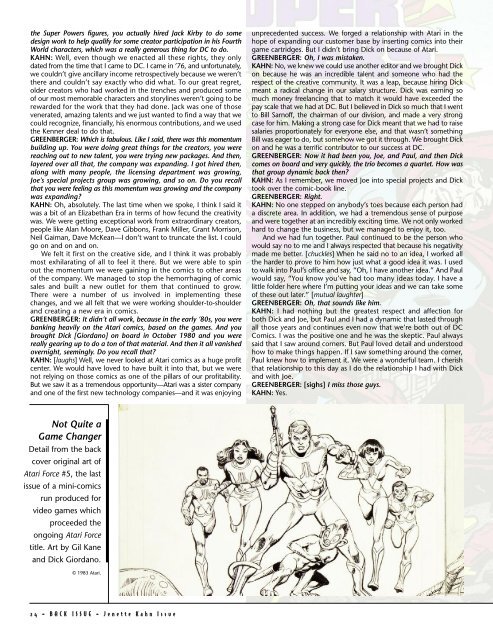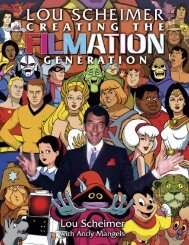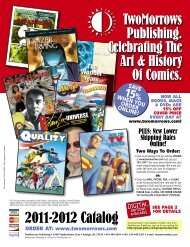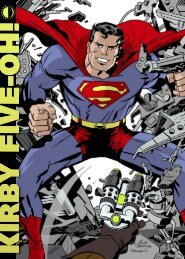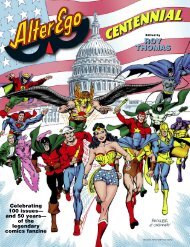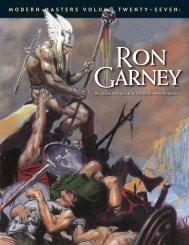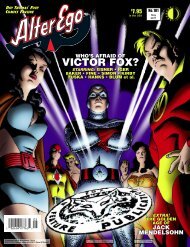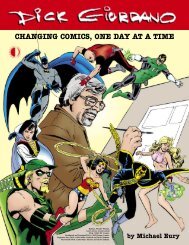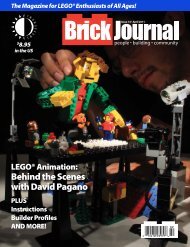JENETTE KAHN - TwoMorrows Publishing Store
JENETTE KAHN - TwoMorrows Publishing Store
JENETTE KAHN - TwoMorrows Publishing Store
Create successful ePaper yourself
Turn your PDF publications into a flip-book with our unique Google optimized e-Paper software.
the Super Powers figures, you actually hired Jack Kirby to do some<br />
design work to help qualify for some creator participation in his Fourth<br />
World characters, which was a really generous thing for DC to do.<br />
<strong>KAHN</strong>: Well, even though we enacted all these rights, they only<br />
dated from the time that I came to DC. I came in ’76, and unfortunately,<br />
we couldn’t give ancillary income retrospectively because we weren’t<br />
there and couldn’t say exactly who did what. To our great regret,<br />
older creators who had worked in the trenches and produced some<br />
of our most memorable characters and storylines weren’t going to be<br />
rewarded for the work that they had done. Jack was one of those<br />
venerated, amazing talents and we just wanted to find a way that we<br />
could recognize, financially, his enormous contributions, and we used<br />
the Kenner deal to do that.<br />
GREENBERGER: Which is fabulous. Like I said, there was this momentum<br />
building up. You were doing great things for the creators, you were<br />
reaching out to new talent, you were trying new packages. And then,<br />
layered over all that, the company was expanding. I got hired then,<br />
along with many people, the licensing department was growing,<br />
Joe’s special projects group was growing, and so on. Do you recall<br />
that you were feeling as this momentum was growing and the company<br />
was expanding?<br />
<strong>KAHN</strong>: Oh, absolutely. The last time when we spoke, I think I said it<br />
was a bit of an Elizabethan Era in terms of how fecund the creativity<br />
was. We were getting exceptional work from extraordinary creators,<br />
people like Alan Moore, Dave Gibbons, Frank Miller, Grant Morrison,<br />
Neil Gaiman, Dave McKean—I don’t want to truncate the list. I could<br />
go on and on and on.<br />
We felt it first on the creative side, and I think it was probably<br />
most exhilarating of all to feel it there. But we were able to spin<br />
out the momentum we were gaining in the comics to other areas<br />
of the company. We managed to stop the hemorrhaging of comic<br />
sales and built a new outlet for them that continued to grow.<br />
There were a number of us involved in implementing these<br />
changes, and we all felt that we were working shoulder-to-shoulder<br />
and creating a new era in comics.<br />
GREENBERGER: It didn’t all work, because in the early ’80s, you were<br />
banking heavily on the Atari comics, based on the games. And you<br />
brought Dick [Giordano] on board in October 1980 and you were<br />
really gearing up to do a ton of that material. And then it all vanished<br />
overnight, seemingly. Do you recall that?<br />
<strong>KAHN</strong>: [laughs] Well, we never looked at Atari comics as a huge profit<br />
center. We would have loved to have built it into that, but we were<br />
not relying on those comics as one of the pillars of our profitability.<br />
But we saw it as a tremendous opportunity—Atari was a sister company<br />
and one of the first new technology companies—and it was enjoying<br />
unprecedented success. We forged a relationship with Atari in the<br />
hope of expanding our customer base by inserting comics into their<br />
game cartridges. But I didn’t bring Dick on because of Atari.<br />
GREENBERGER: Oh, I was mistaken.<br />
<strong>KAHN</strong>: No, we knew we could use another editor and we brought Dick<br />
on because he was an incredible talent and someone who had the<br />
respect of the creative community. It was a leap, because hiring Dick<br />
meant a radical change in our salary structure. Dick was earning so<br />
much money freelancing that to match it would have exceeded the<br />
pay scale that we had at DC. But I believed in Dick so much that I went<br />
to Bill Sarnoff, the chairman of our division, and made a very strong<br />
case for him. Making a strong case for Dick meant that we had to raise<br />
salaries proportionately for everyone else, and that wasn’t something<br />
Bill was eager to do, but somehow we got it through. We brought Dick<br />
on and he was a terrific contributor to our success at DC.<br />
GREENBERGER: Now it had been you, Joe, and Paul, and then Dick<br />
comes on board and very quickly, the trio becomes a quartet. How was<br />
that group dynamic back then?<br />
<strong>KAHN</strong>: As I remember, we moved Joe into special projects and Dick<br />
took over the comic-book line.<br />
GREENBERGER: Right.<br />
<strong>KAHN</strong>: No one stepped on anybody’s toes because each person had<br />
a discrete area. In addition, we had a tremendous sense of purpose<br />
and were together at an incredibly exciting time. We not only worked<br />
hard to change the business, but we managed to enjoy it, too.<br />
And we had fun together. Paul continued to be the person who<br />
would say no to me and I always respected that because his negativity<br />
made me better. [chuckles] When he said no to an idea, I worked all<br />
the harder to prove to him how just what a good idea it was. I used<br />
to walk into Paul’s office and say, “Oh, I have another idea.” And Paul<br />
would say, “You know you’ve had too many ideas today. I have a<br />
little folder here where I’m putting your ideas and we can take some<br />
of these out later.” [mutual laughter]<br />
GREENBERGER: Oh, that sounds like him.<br />
<strong>KAHN</strong>: I had nothing but the greatest respect and affection for<br />
both Dick and Joe, but Paul and I had a dynamic that lasted through<br />
all those years and continues even now that we’re both out of DC<br />
Comics. I was the positive one and he was the skeptic. Paul always<br />
said that I saw around corners. But Paul loved detail and understood<br />
how to make things happen. If I saw something around the corner,<br />
Paul knew how to implement it. We were a wonderful team. I cherish<br />
that relationship to this day as I do the relationship I had with Dick<br />
and with Joe.<br />
GREENBERGER: [sighs] I miss those guys.<br />
<strong>KAHN</strong>: Yes.<br />
Not Quite a<br />
Game Changer<br />
Detail from the back<br />
cover original art of<br />
Atari Force #5, the last<br />
issue of a mini-comics<br />
run produced for<br />
video games which<br />
proceeded the<br />
ongoing Atari Force<br />
title. Art by Gil Kane<br />
and Dick Giordano.<br />
© 1983 Atari.<br />
2 4 • B A C K I S S U E • J e n e t t e K a h n I s s u e


